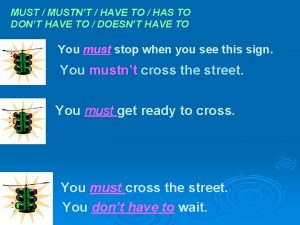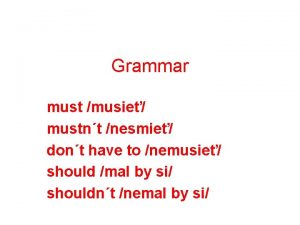HAVE TO DONT HAVE TO MUST MUSTNT RULES





- Slides: 5

HAVE TO/ DON’T HAVE TO MUST / MUSTN’T RULES AND EXPLANATIONS

We can use 'must' to show that we are certain something is true. We are making a logical deduction based upon some clear evidence or reason. �There's no heating on. You must be freezing. �You must be worried that she is so late coming home. �I can't remember what I did with it. I must be getting old. �It must be nice to live in Florida.

We also use 'must' to express a strong obligation. When we use 'must' this usually means that some personal circumstance makes the obligation necessary (and the speaker almost certainly agrees with the obligation. ) �I must go to bed earlier. �They must do something about it. �You must come and see us some time. �I must say, I don't think you were very nice to him.

We can also use 'have to' to express a strong obligation. When we use 'have to' this usually means that some external circumstance makes the obligation necessary. �I have to arrive at work at 9 sharp. My boss is very strict. �We have to give him our answer today or lose out on the contract. �You have to pass your exams or the university will not accept you. �I have to send a report to Head Office every week.

Be careful about the difference between mustn't and don't have to! Mustn't means it's not allowed, or it's a bad idea: �You mustn't eat so much chocolate, you'll be sick �Don't have to means you don't need to do something, but it's fine if you want to do it: �I don't have to get up early at the weekend(of course, if I want to get up early, that's fine, but I can stay in bed if I want).









